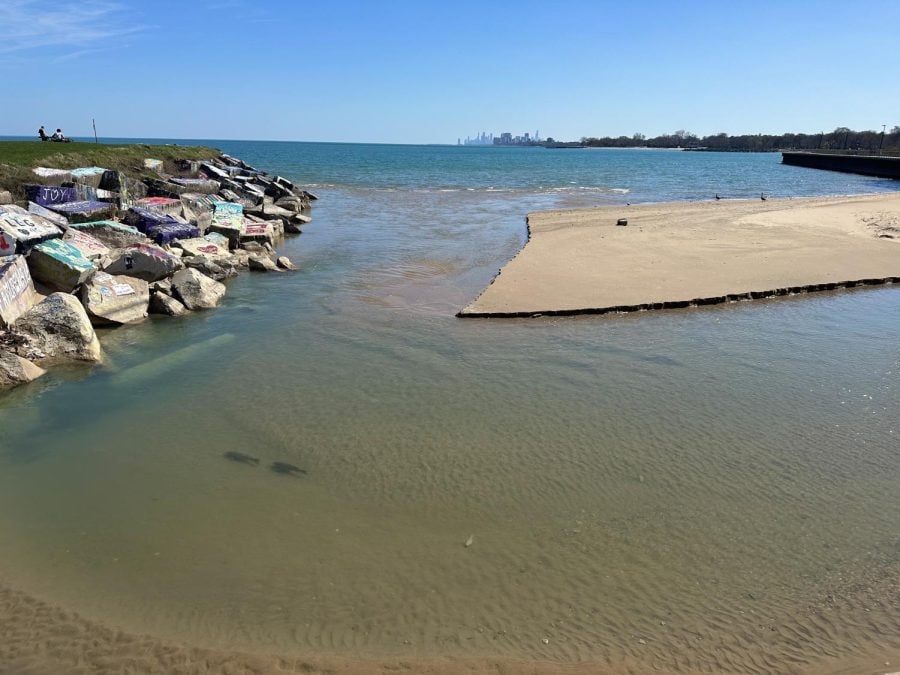Evanston moves forward with shoreline reconstruction plans
Nora Collins/Daily Senior Staffer
Lake Michigan shoreline. Increasing lake level variability poses a challenge for minimizing land erosion.
April 18, 2023
When Jeff Green was growing up in Chicago’s Rogers Park neighborhood, he’d spend his summers and winters on Howard Beach — sunbathing one season, sledding another.
“I recently drove by there, and the beach is gone,” said Green, who now lives in Evanston. “It’s underwater.”
City officials closed Howard beach due to erosion in 2020, according to the Chicago Park District. That year, Lake Michigan reached a 30-year high water level, with 9-foot waves wreaking havoc on lakeside infrastructure. The increasing lake-level variability likely comes as a result of climate change, climate researcher Ryan Harp said.
In April 2022, Evanston City Council awarded a $333,000 coastal engineering contract to SmithGroup, an architecture company hired to develop solutions to avoid deterioration of the land by Lake Michigan. But Evanston Senior Project Manager Stefanie Levine, who manages the city’s ongoing shoreline repairs, said Evanston hasn’t yet decided when it will implement the project.
The reconstruction could cost around $46 million in total, according to a 2020 estimate by Evanston Division Fire Chief Kim Kull. Levine said the repairs hinge on not just completing the preliminary design process but also securing funding from highly competitive federal grants. But, she said, it’s a process that’s necessary.
“It’s predicted that there will be more (lake-level) variability,” Levine said. “We’re embarking on this project to make us more resilient to changing conditions: The lake is something we don’t have a lot of control over.”
The city already completed emergency lakefront stabilization work in 2020 on the Elliot Park, Garden Park and Greenwood and Dempster Street Beaches following extensive flooding and immediate water damage to buildings and parks.
“Those were temporary solutions. We really need to think about permanent solutions that will help us be more adaptable to the ever-changing lakefront,” Levine said.
Harp, who researched lake-level fluctuations at the University Corporation for Atmospheric Research, said water patterns are tied directly to warming temperatures. Since lake levels are byproducts of precipitation, runoff and evaporation, Harp said there’s an emerging “tug-of-war” between intense precipitation and evaporation. Both are impacted by warming temperatures and extreme weather.
Green, who co-leads the Evanston Citizens’ Climate Lobby, said water temperatures in the Great Lakes during the summer have been increasing over the past six decades.
“In terms of things like thermal expansion, when you heat water up, it occupies a larger space, which would tend to increase lake levels and thereby flood risk,” Green said. “There are a number of factors that may impact Evanston as far as the expected increases in Lake Michigan over the coming years.”
Many Lake Michigan and Great Lakes communities are dealing with similar erosion concerns, said Cara Pratt, Evanston’s sustainability and resilience manager. Pratt said the unpredictability of the lake levels makes potential solutions nuanced.
The city has hosted two public engagement events on shoreline revitalization, and Levine said it plans to host one more before the preliminary design moves forward.
Green said Evanston and SmithGroup should also consider adapting in case the climate changes beyond its current pace. This could cause higher waves that threaten restorations in the future. But Pratt said revitalizations along the shoreline are still needed.
“It’s critical that we have a resilient ecosystem and that would include any sort of shoreline revitalization efforts,” Pratt said.
Email: [email protected]
Twitter: @noracollins02
Related Stories:
— Evanston’s lakefront stabilization proves costly, city contracts SmithGroup to address issue
— Northwestern tackles coastal stabilization project as lake levels continue to threaten shorelines
— Evanston ends beach token system, makes beaches more financially accessible


